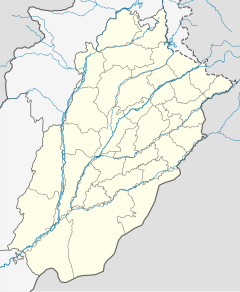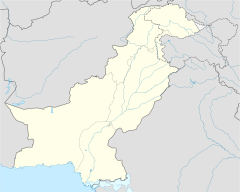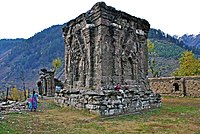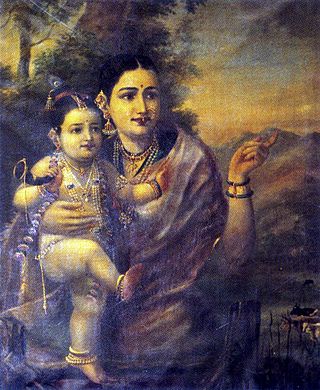
Krishna Janmashtami, also known simply as Krishnashtami, Janmashtami, or Gokulashtami, is an annual Hindu festival that celebrates the birth of Krishna, the eighth avatar of Vishnu. In certain Hindu texts, such as the Gita Govinda, Krishna has been identified as supreme God and the source of all avatars. Krishna's birth is celebrated and observed on the eighth day (Ashtami) of the dark fortnight in Shravana Masa. According to the purnimanta tradition), Krishna's birth is celebrated on the eighth day (Ashtami) of the dark fortnight in Bhadrapada Masa.

Hindus are the third largest Religious group in the United Arab Emirates and constitute around 6.6%-15% of the population in the nation. Hinduism is followed mainly by the significant Nepali and Indian population in the United Arab Emirates.
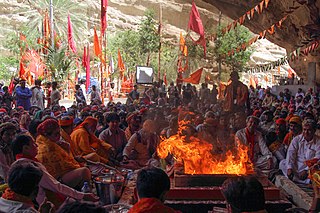
Hinduism is the second largest religious affiliation in Pakistan after Islam. Though Hinduism was one of the dominant faiths in the region a few centuries ago, its adherents accounted for just 2.17% of Pakistan's population according to the 2023 Pakistani census. With the largest population concentration in eastern Sindh province, Umerkot district has the highest percentage of Hindu residents in the country at 54.6%, while Tharparkar district has the most Hindus in absolute numbers at 811,507. Hindus are also found in southern Punjab and in areas of Balochistan and Khyber Pakhtunkhwa.
Punjabi Hindus are adherents of Hinduism who identify ethnically, linguistically, culturally, and genealogically as Punjabis and are natives of the Punjab region of the Indian subcontinent. Punjabi Hindus are the third-largest religious group of the Punjabi community, after the Punjabi Muslims and the Punjabi Sikhs. While Punjabi Hindus mostly inhabit the Indian state of Punjab, as well as Haryana, Himachal Pradesh, Delhi, and Chandigarh today, many have ancestry across the greater Punjab region, which was partitioned between India and Pakistan in 1947.

The Shri Katas Raj Temples, also known as Qila Katas, is a complex of several Hindu temples connected to one another by walkways. The temple complex surrounds a pond named Katas which is regarded as sacred by Hindus. The complex is located in the Potohar Plateau region of Pakistan's Punjab province. The temples are located in municipal committee Choa Saidanshah, and are near the M2 Motorway.

The Krishna Mandir is a Hindu temple (mandir) dedicated to the Hindu deity Krishna located in Ravi Road, opposite of Timber Market in Lahore, Punjab, Pakistan. In 2006, the temple became a centre of controversy due to media reports on its demolition which later turned out incorrect. In the contemporary era, it is one of two functional Hindu temples in Lahore, the other being Valmiki Mandir.

The Shri Swami Narayan Mandir, Karachi is a Hindu temple that is the only Swami Narayan temple in Pakistan. The temple is notable for its size and frontage, over 32,306 square yards (27,012 m2) on the M. A. Jinnah Road in Karachi city. The temple celebrated its anniversary of 216 years in April 2004. There is a sacred cowshed within the premises of this temple. The temple is located at the centre of a Hindu neighbourhood in Karachi. The building that housed a dharmshala for visiting devotees has now been converted to the office of the City District Government.
Sri Radha Shyamasundar Mandir is a Hindu temple located in Haebangchon, Seoul, South Korea. The temple opens each morning and evening at specific darshan times. Special programs are also held on Sundays, such as free children's Bal Vikas classes, yoga classes, and a special Sunday feast program with Bhagavad Gita lectures.

Durgiana Temple or Shri Durgiana Mandir is a Hindu temple situated in the city of Amritsar in Punjab, India. Though a Hindu temple, its architecture is similar to the Sikh Harmandir Sahib. The temple derives its name from the Goddess Durga, the chief Goddess who is worshipped here. Murtis of Lakshmi and Vishnu are also located and worshipped in the temple.
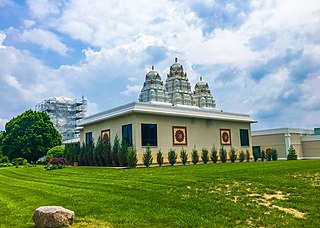
The Hindu Temple of Dayton is a Hindu temple in Beavercreek, Ohio. It opened in 1984, making it the oldest Hindu temple in the Dayton metropolitan area. It has shrines for the deities Venkateshwara, Rama and Sita, Lakshmana and Hanuman, Ganesha, and Radha Krishna.
Hindu Temple and Cultural Center of the Rockies in Centennial, Colorado is the major Hindu Temple in the Denver, Colorado region. The Hindu Society of Colorado was incorporated in 1984. During 1996-2015 the temple was located in a former church building in Littleton. The formally designed temple opened on July 3, 2015. with Prana Pratishtha on June 5–7, 2015. The temple membership grew to include 1,500 families in 2011. The temple is non-regional and non-sectarian.

Lava Temple is a Hindu place of worship dedicated to the Hindu deity Lava, the son of Rama. It is in Lahore Fort, Lahore, Pakistan, and dates to the Sikh period. According to a Hindu legend, Lahore is named after him.

The Kalka Devi Temple, Kalka Devi Cave Temple or Kalka Devi Mandir is one of the holiest Hindu temples in Pakistan. It is situated inside a natural cave in the Kalka hills in Aror, Sindh province, Pakistan. The temple is known as the Asthan of Kalka Devi. It is visited by both Hindus and Muslims. Hindus from India also visit. The majority of devotees visiting the temple are Muslims.

The Shri Krishna mandir, or the Krishna Temple, is a Hindu temple located in Rawalpindi in the Punjab province of Pakistan. It is situated between the Rawalpindi railway station and Kabari Bazaar in Saddar. It was built during the late British Raj on 1897. Currently, it is one of the two places of worship for the approximately 7,000 Hindus living in Rawalpindi and Islamabad, with the other handful of temples being non-functional. Hindu festivals like Holi and Diwali are celebrated here.
Krishna Mandir or Krishna Temple may refer to these temples dedicated to the Hindu god Krishna:
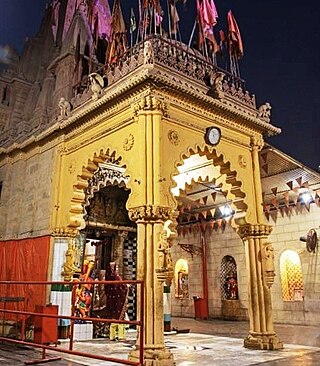
The Panchmukhi Hanuman Mandir is a historic Hindu mandir in Karachi, Pakistan. The mandir was declared as a national heritage under the Sindh Cultural Heritage (Preservation) Act 1994 and is believed to be at least 1,500 years old.
The Geeta Mandir is a Hindu temple located at Model Town, Jalandhar, city of Punjab, India. It is dedicated to Lord Krishna. Located in Model town. it is one of the most active temples in the Jalandhar city after Devi Talab Mandir.
